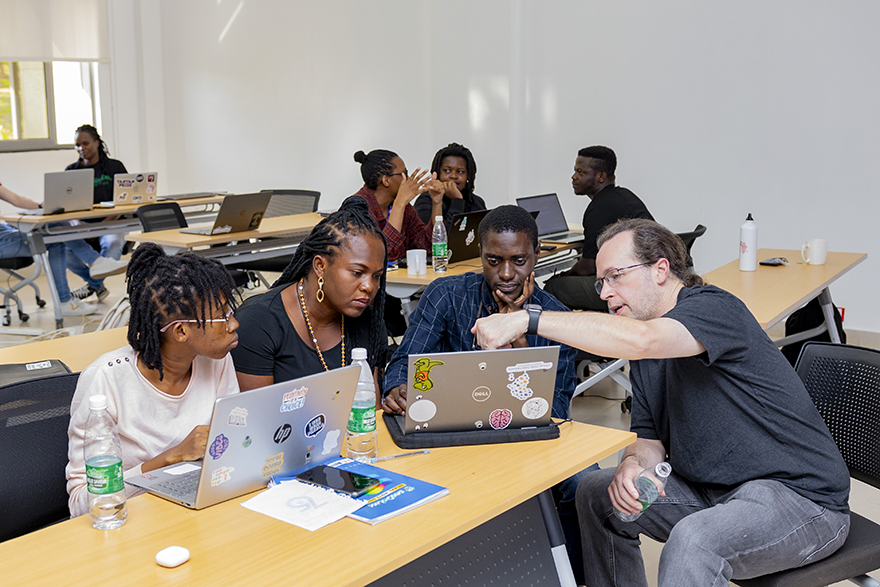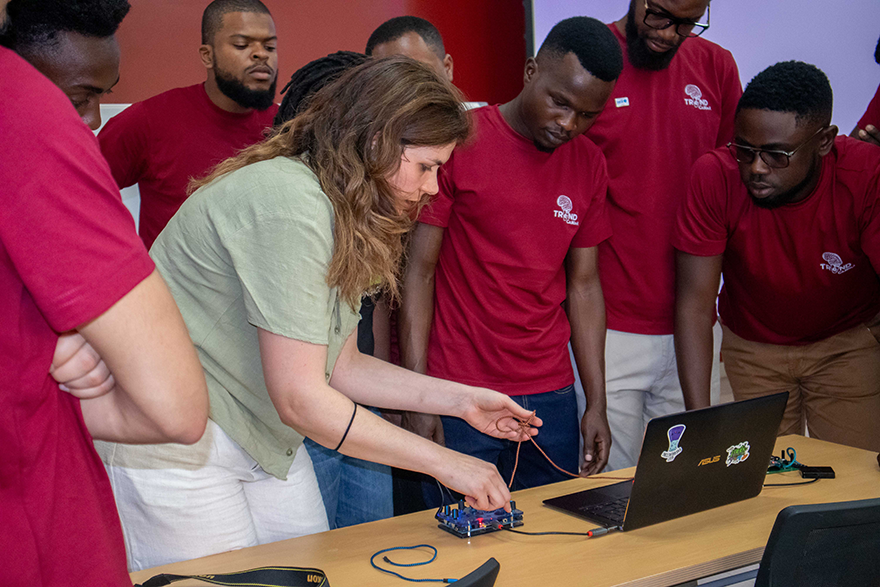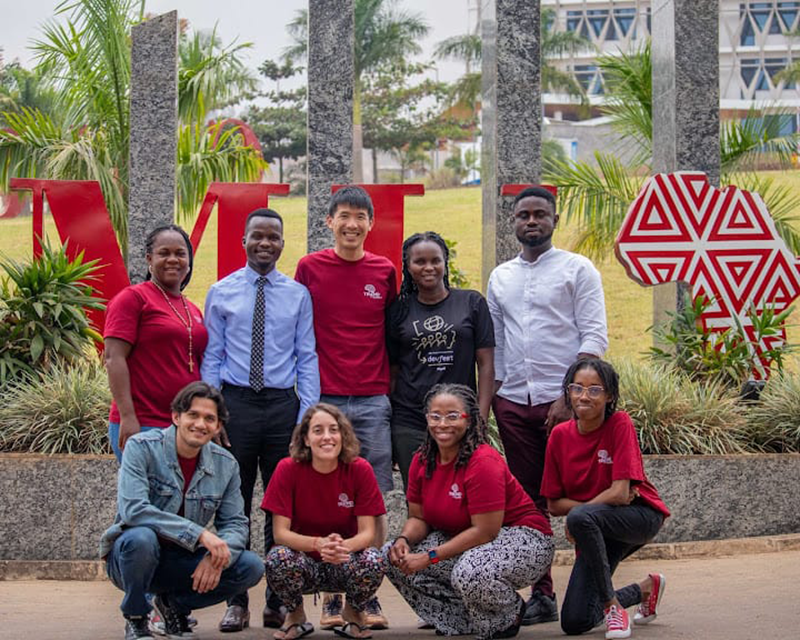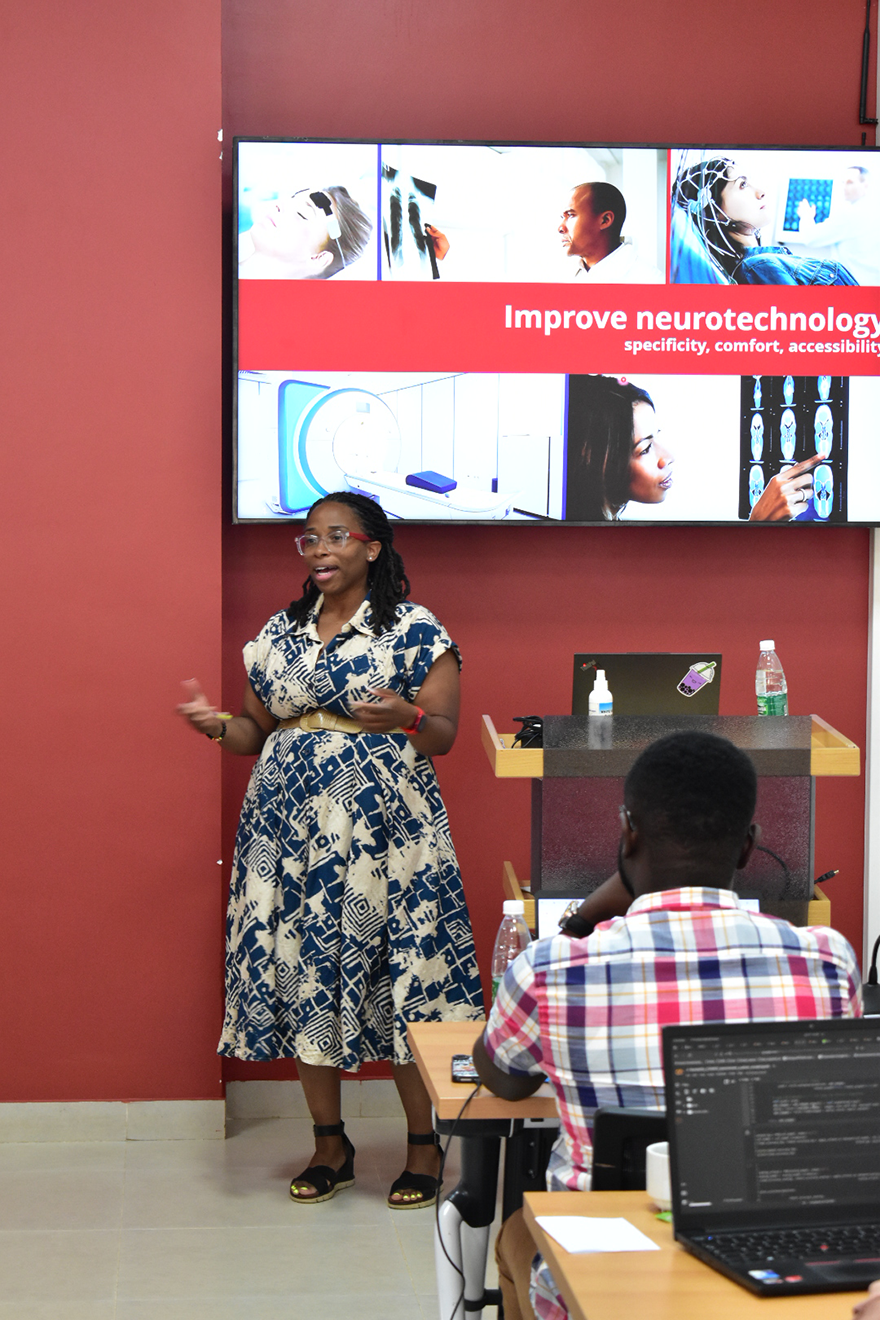Teaching computational neuroscience on the African continent
CMU-Africa, CMU-Pittsburgh, and the non-profit TReND in Africa held a summer school focused on computational neuroscience and machine learning. What began as an idea from two postdocs turned into a highly-selective program drawing in more than 1,000 applications from across the continent.
In 2024, Carnegie Mellon University Africa, CMU-Pittsburgh, and the non-profit TReND in Africa (Teaching and Research in Natural Sciences for Development in Africa) held a summer school in Kigali, Rwanda focused on computational neuroscience and machine learning. The highly-selective program included a fully-funded experience for 20 students, but drew in more than 1,000 applications from across the continent.
The program—Computational Neuroscience and Machine Learning in Africa, or “CaMinA” for short—was held at CMU-Africa for the first time following its launch at the University of Ghana in summer of 2023. For two and a half weeks, students received both theoretical and hands-on training in basic concepts in the fields of neuroscience, computational neuroscience, and machine learning. Carnegie Mellon University faculty, including Sossena Wood and Byron Yu, led lectures and coding exercises. The program also included exposure to other experts and organizations, such as the Allen Institute, which taught a mini-course on their publicly available datasets. The students used the Allen Institute datasets in their research projects, where they teamed up in groups and applied the computational techniques learned during the course to analyze the data.

Participants in the summer course held at CMU-Africa.
“My favorite part of the course included all of the practical sessions,” said Jessica Oparebea, a program participant from the University of Ghana. “I was able to learn more about the basics of neuroscience and how to actually apply machine learning for deeper data analysis.” Oparebea, an undergraduate student in the university’s biomedical engineering department, will graduate in 2025 and plans to continue developing skills in computational methods for the design of medical devices. In particular, she wants to focus on optical techniques for the imaging of the brain.
In addition to teaching key concepts related to neuroscience and machine learning, the program also had a strong emphasis on developing research collaborations and building working relationships among the students. By encouraging knowledge exchange, the program hopes to create a research community of computational neuroscientists on the continent.
“First among the things I enjoyed most about the course was the diversity of the group, among both students and facilitators. It was a very rich experience building friendships and sharing ideas and experiences with people from close to 20 countries from around the world,” said Angelo Karugo, a participant from Pwani University in Kenya.

A demonstration of a printed circuit board device that simulates the dynamics of real neurons.
The program began as a grassroots initiative from two postdoctoral students: Joana Soldado Magraner from Carnegie Mellon University (working with professors Byron Yu and Matthew Smith), and Saray Soldado Magraner from University of California, Los Angeles. Through travel and international collaborations, the sisters found a significant gap in the interest and knowledge of the field of computational neuroscience in Africa.
“We realized that by teaching the foundation of computational neuroscience on the continent, we could potentially excite African students about a whole field that they hadn’t considered before,” said Joana, a postdoc in the CMU Department of Electrical and Computer Engineering and the Neuroscience Institute. “It’s a field that has great potential in Africa. It is cost-effective for academic institutions because it doesn’t require a whole new lab setup. And, it can have a direct impact on healthcare—which interests many young Africans.”

At the time, there were successful training schools and programs on the continent focused on more advanced topics in computational neuroscience such as the Simons Computational Neuroscience Imbizo in South Africa. Joana and Saray saw an opportunity for a program that started with the basics of the field to help bridge the gap in knowledge and foster interest.
To develop the program, the sisters knew that they would need to find a partner who could connect them on several levels: locally in specific African regions and across the continent. They found TReND in Africa, a volunteer-run charity supporting scientific capacity building across Africa, and the two joined forces. The non-profit runs biomedical training courses, provides universities with scientific equipment, runs academic volunteering and outreach schemes, and supports work with African researchers.

BME’s Sossena Wood presenting at the CaMiNA course.
“We are absolutely thrilled with our collaboration with CMU-Africa and CMU-Pittsburgh. As a non-profit organization dedicated to supporting research and education in Africa, it is immensely gratifying to partner with an institution that shares our commitment to advancing knowledge and fostering talent on the continent,” said Artemis Koumoundourou, executive director at TReND in Africa and CaMinA co-organizer.
The annual program—a significant undertaking—includes a group of international organizers. Joana, Saray, and Artemis are joined by Gabriela Michel and Emmanuel Marquez-Legorreta (postdoctoral students from HHMI’s Janelia Research Campus), and Tom George (Ph.D. student at the Sainsbury Wellcome Centre for Neural Circuits and Behaviour). This summer, CMU-Africa’s Tim Brown also helped with the local organization for the course held in Kigali.
“Importantly, we run the course thanks to the help of many researchers from a diversity of international institutions, as well as local institutions within Africa,” said Joana. “These researchers volunteer to help us with the student selection process, the teaching on site, and the local logistics.” Joana notes that one of these volunteers is Gilgal Justice Ansah, a student from Ghana who is a Ph.D. student at the University of Pittsburgh.
The team has already begun plans for both the 2025 and 2026 CaMinA course. The 2025 course will take place July 7-23 at the University of Zambia, in Lusaka, Zambia. The 2026 course will take place at AIMS Senegal, in Dakar, Senegal.
The CaMinA program was sponsored by Carnegie Mellon University Africa, CMU’s Neuroscience Institute, the Center for the Neural Basis of Cognition, the Allen Institute, the Simons Foundation, HHMI’s Janelia Research Campus, the Sainsbury Wellcome Centre, University College London, Google-Deepmind, and Meta. To learn more about supporting or partnering with this program, please contact Artemis Koumoundourou at artemis@trendinafrica.org.
